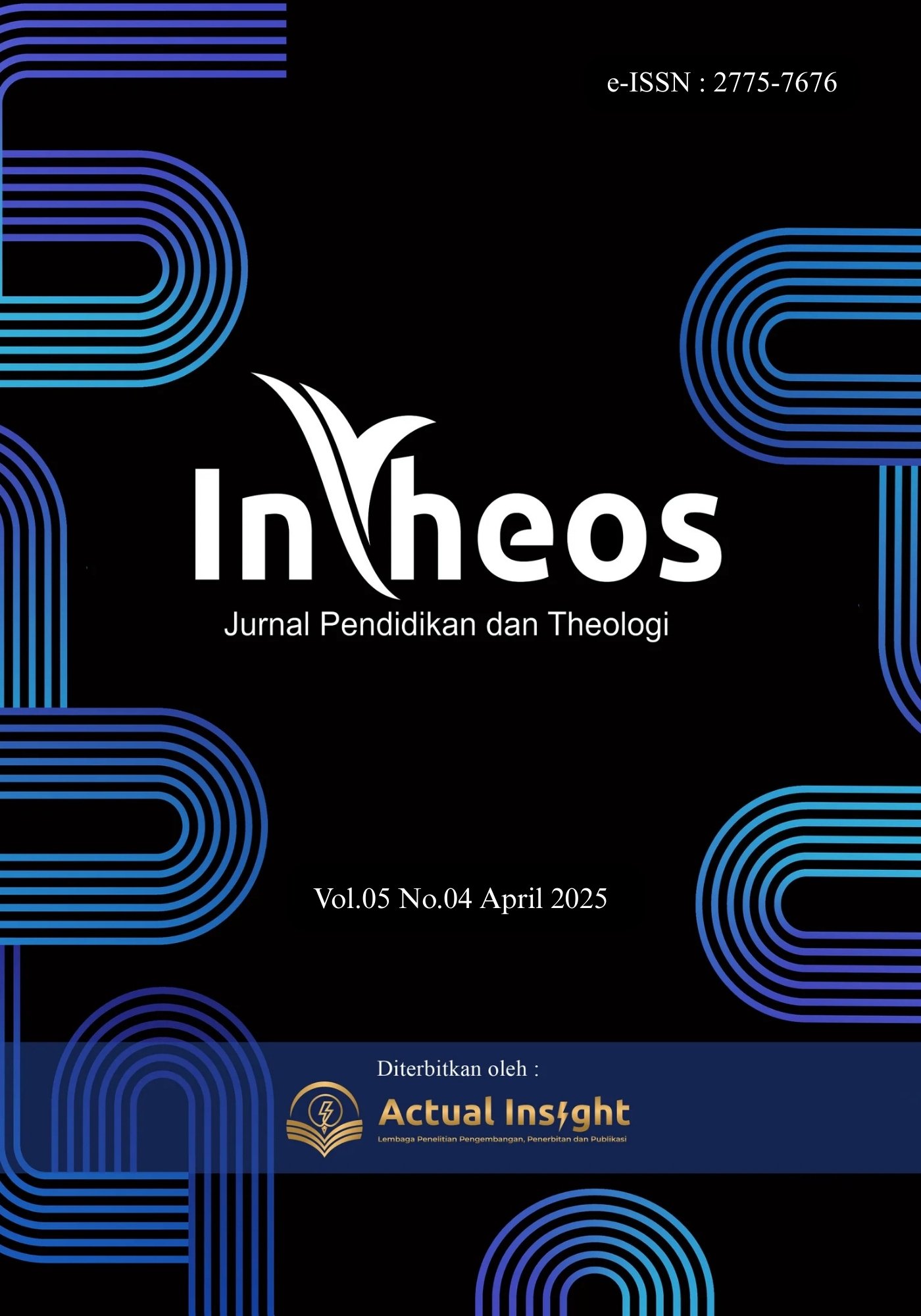

Christian Education and Social Justice: Pursuing Shalom in the Public Sphere
-
Universitas Pembangunan Jaya
-
Sekolah Tinggi Teologi Injili Philadelphia
DOI:
https://doi.org/10.56393/intheos.v5i4.2942-
Christian Education and Social Justice: Pursuing Shalom in the Public Sphere. Christian education is crucial in advancing social justice through a theological framework grounded in shalom. This article aims to critically examine how Christian education can serve as a transformative force amid global inequality and social fragmentation. A systematic literature review method was applied, analyzing peer-reviewed Scopus-indexed theology, education, and ethics publications. The findings reveal the need to integrate values such as reconciliation, compassion, inclusivity, and justice into Christian pedagogy, curriculum, and institutional culture. The approach includes relational learning, public religious pedagogy, and prioritizing marginalized communities through the principle of preferential options for the poor. The conclusion of this study is that shalom-based Christian education not only forms individuals with character, but also produces active agents of change in society. This study recommends that there needs to be an emphasis on the importance of the role of teachers, contextual curriculum, and public testimony as a real manifestation of the call of faith.
-
Alexander, F., Tameon, S. M., Manuain, L. M. M., & Dami, Z. A. (2021). Similarities between the pedagogy of shalom and shared christian faith as a synergetic partnership a critical reflection on neoliberal pedagogy. European Journal of Science and Theology, 17(2), 43 – 56.
Benson, D. M. (2018). God’s curriculum: Reimagining education as a journey towards shalom. In Reimagining Christian Education: Cultivating Transformative Approaches. https://doi.org/10.1007/978-981-13-0851-2_2
Bobbert, M. (2017). Religious education towards justice: What kind of justice is to be taught in a Christian context? Education Sciences, 7(1). https://doi.org/10.3390/educsci7010030
Caspers, T., & Counet, P. C. (2013). Why the poor? The “preferential option for the poor” in light of the sermon on the mount. Tijdschrift Voor Theologie, 53(4), 337 – 354.
Cettolin, A. U. (2024). Christ-enlivened practices: An action research investigation of shared meals in a higher education classroom. International Journal of Christianity and Education, 28(1), 71 – 87. https://doi.org/10.1177/20569971231174841
Grech, M., & Mayo, P. (2014). What Catholic educators can learn from the radical Christianity and critical pedagogy of Don Lorenzo Milani. International Studies in Catholic Education, 6(1), 33 – 45. https://doi.org/10.1080/19422539.2013.869952
Grümme, B. (2021). Enlightened heterogeneity: Religious education facing the challenges of educational inequity. Religions, 12(10). https://doi.org/10.3390/rel12100835
Gultom, A. F. (2024). Objektivisme Nilai dalam Fenomenologi Max Scheler. De Cive : Jurnal Penelitian Pendidikan Pancasila Dan Kewarganegaraan, 4(4), 141–150. https://doi.org/10.56393/decive.v4i4.2107
Hickey, A., & Riddle, S. (2022). Relational pedagogy and the role of informality in renegotiating learning and teaching encounters. Pedagogy, Culture and Society, 30(5), 787 – 799. https://doi.org/10.1080/14681366.2021.1875261
Hickey, A., & Riddle, S. (2024). Proposing a conceptual framework for relational pedagogy: pedagogical informality, interface, exchange and enactment. International Journal of Inclusive Education, 28(13), 3271 – 3285. https://doi.org/10.1080/13603116.2023.2259906
Kimanen, A. (2023). Privileged and non-privileged agencies–education about, into and with social justice in religious education classrooms. British Journal of Religious Education, 45(3), 277 – 287. https://doi.org/10.1080/01416200.2022.2086103
Kits, G. J. (2019). Why educating for shalom requires decolonization. International Journal of Christianity and Education, 23(2), 185 – 203. https://doi.org/10.1177/2056997119826123
Lo, S. (2022). The roles of Christian schools in mitigating ethno-religious violence in Indonesia. International Journal of Christianity and Education, 26(3), 300 – 314. https://doi.org/10.1177/20569971211064993
Luna De La Rosa, M., M., & Jun, A. (2019). The Unfinished Business of Social Justice in Christian Higher Education. Christian Higher Education, 18(5), 356–369. https://doi.org/10.1080/15363759.2019.1633833
McKinney, S. J. (2018). The roots of the preferential option for the poor in Catholic schools in Luke’s Gospel. International Studies in Catholic Education, 10(2), 220 – 232. https://doi.org/10.1080/19422539.2018.1492264
McKinney, S. J. (2023). Applied Catholic Social Teaching: Preferential option for the poor and Catholic schools. International Journal for the Study of the Christian Church, 23(1), 31 – 47. https://doi.org/10.1080/1474225X.2023.2175531
Mernissi, F. (2024). The Role of Religion in Promoting Social Justice in Contemporary European Societies. European Journal for Philosophy of Religion, 16(1), 126 – 139. https://doi.org/10.24204/ejpr.2024.4391
Neustaeter, R., & Senehi, J. (2023). Peace-Building and Conflict Resolution Education. In The Handbook of Adult and Continuing Education: 2020 Edition. https://doi.org/10.4324/9781003447849-40
Norris, K. (2020). Formation for public life: Bonhoeffer’s approach to theological education. Dialog, 59(2), 115 – 123. https://doi.org/10.1111/dial.12544
Nuttall, J., & Gerard McEvoy, J. (2020). Theological-relational pedagogy: Winnicott, Rahner, and the development of a theological perspective on relational pedagogy. Journal of Curriculum Studies, 52(5), 720 – 731. https://doi.org/10.1080/00220272.2019.1686180
Pirner, M. L. (2015). Representation and translation as central tasks of a public theology and religious pedagogy. Evangelische Theologie, 75(6), 446 – 458.
Pirner, M. L. (2017). Public Religious Pedagogy: Linking Public Theology, Social Theory and Educational Theory. International Journal of Public Theology, 11(3), 328 – 350. https://doi.org/10.1163/15697320-12341497
Pirner, M. L. (2018). Public Religious Pedagogy—An Emerging New Paradigm? In Public Theology Perspectives on Religion and Education. https://doi.org/10.4324/9780429464973-4
Platow, B. (2018). Good Decision-Making in the Field of Business: A Discussion of the Challenges and Opportunities Offered by Public Religious Education. In Public Theology Perspectives on Religion and Education. https://doi.org/10.4324/9780429464973-10
Power, S. (2008). How should we respond to the continuing failure of compensatory education? Orbis Scholae, 2(2), 19 – 37. https://doi.org/10.14712/23363177.2018.231
Power, S., & Taylor, C. (2013). Social justice and education in the public and private spheres. Oxford Review of Education, 39(4), 464 – 479. https://doi.org/10.1080/03054985.2013.821854
Sedmak, C. (2016). Poverty Alleviation: An Opportunity for Universities. Studies in Global Justice, 14, 259 – 280. https://doi.org/10.1007/978-3-319-41430-0_15
Shore, M. (2016). Religion and Conflict Resolution: Christianity and South Africa’s Truth and Reconciliation Commission. In Religion and Conflict Resolution: Christianity and South Africa’s Truth and Reconciliation Commission. https://doi.org/10.4324/9781315604732
Sianturi, N., Wagiu, M. M., Manua, E. R., Veronika, T., & Solang, Z. (2022). Pendidikan Kristen sebagai Solusi Progresif dalam Menanggapi Tantangan Kesenjangan Sosial. Harati: Jurnal Pendidikan Kristen, 4(1). https://doi.org/10.54170/harati.v4i1.395
Shortt, J. (2017). Is talk of ‘christian education’ meaningful? In Christian Faith, Formation and Education. https://doi.org/10.1007/978-3-319-62803-5_3
Todd, N. R., & Rufa, A. K. (2013). Social Justice and Religious Participation: A Qualitative Investigation of Christian Perspectives. American Journal of Community Psychology, 51(3–4), 315 – 331. https://doi.org/10.1007/s10464-012-9552-4
-
Downloads
Download data is not yet available.
How to Cite

This work is licensed under a Creative Commons Attribution-ShareAlike 4.0 International License.


e-ISSN : 2775-7676 p-ISSN : 2776-7450
Indexed by:
Indexed by:








